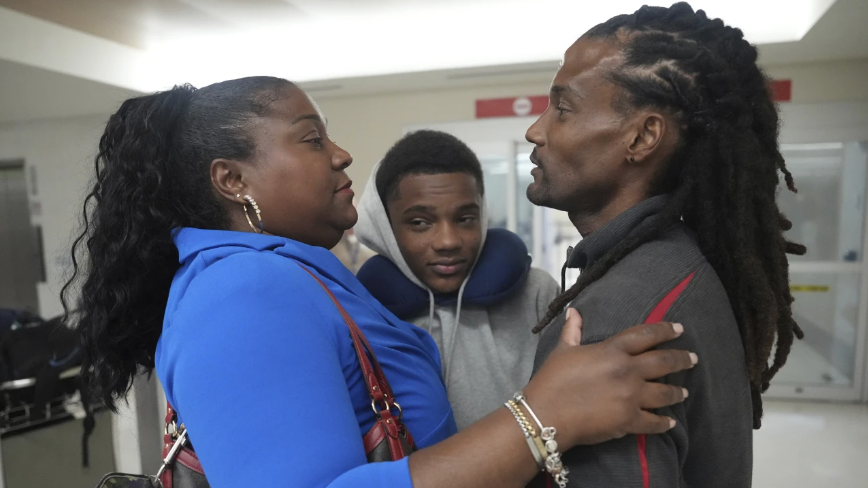Biden policy allowing migrants from 4 countries into the US is praised, criticized at Texas trial

By JUAN A. LOZANO
Associated Press
HOUSTON (AP) — During a trial Thursday on the fate of an immigration program focused on people from Central America and the Caribbean, lawyers for Texas and 20 other Republican-leaning states suing to stop it accused the federal initiative of being outside the law.
But an American sponsoring one of the migrants — a 34-year-old friend from Nicaragua named Oldrys and who’s now in the U.S. thanks to the program — praised its economic benefits and credited it for letting him reciprocate kindness to someone in need.
“We really see this as an opportunity to welcome Oldrys into our family …. in a time of need for him,” said Eric Sype.
Under the humanitarian parole program, up to 30,000 people are being allowed each month to enter the U.S. from Cuba, Haiti, Nicaragua and Venezuela.
The federal government and immigrant rights groups are defending the program, saying it’s been successful at reducing migration and a humanitarian crisis on the southern border and has provided a safe pathway to the U.S. for desperate migrants who would otherwise be paying human smugglers and bogging down border agents.
A federal trial on the states’ lawsuit was being presided over by U.S. District Judge Drew Tipton in Victoria, Texas. Tipton, an appointee of former President Donald Trump, has previously ruled against the Biden administration on who to prioritize for deportation.
Migrants paroled into the program have a sponsor who vouches for them financially.
In court on Thursday, Sype, of Oakland, California, testified that he helped Oldrys apply for the program, and connected him with housing and a job. He now lives in Sype’s childhood home in Washington state, where Sype’s cousin has offered Oldrys a job on the family’s farm, which has always struggled to find enough workers. Sype said his friend Oldrys, whose last name has not been released, was struggling to find work and support his family in Nicaragua, a country facing economic struggles from hurricane damage, political uprisings and the pandemic.
Lawyers for Texas argued on Thursday that the parole program is forcing them to spend millions of dollars on health care, driver’s licenses, public education and incarceration costs associated with the paroled migrants.
In opening arguments against the states and in support of the government policy, lawyer Monika Langarica, of the UCLA Center for Immigration Law and Policy, said those claims were inaccurate. She pointed to Oldrys’ case as an example of how the program can help fill critical labor shortages in a boost to the economy.
Langarica said that for over 70 years, immigration law has given presidents the authority to grant such parole.
The UCLA center is one of the groups arguing on behalf of seven people sponsoring migrants, including Sype.
Sype was the only witness during the trial as attorneys for Texas and the U.S. Justice Department, which is representing the federal government in the lawsuit, didn’t offer testimony. They then rested their cases based on evidence previously submitted.
Closing arguments in the trial began Thursday afternoon and were set to finish Friday. Tipton was expected to issue a ruling at a later date. The trial was being livestreamed from Victoria to a federal courtroom in Houston.
In closing arguments, Gene Hamilton, one of the attorneys representing the states, said the federal government was not following immigration law because the large number of migrants being paroled in the U.S. shows officials are granting parole en masse and not on a case by case basis as required.
As of the end of July, more than 72,000 Haitians, 63,000 Venezuelans, 41,000 Cubans and 34,000 Nicaraguans had been vetted and authorized to come to the U.S. through the parole program.
The Biden administration “created a shadow immigration system,” said Hamilton, an attorney with America First Legal Foundation, a conservative legal nonprofit led by former Trump adviser Stephen Miller that’s working with the Texas Attorney General’s Office to represent the states.
While the Republican states’ lawsuit is objecting to the use of humanitarian parole for migrants from Cuba, Haiti, Nicaragua and Venezuela, it hasn’t raised any concerns for its use to grant entry to tens of thousands of Ukrainians when Russia invaded.
The parole program was started for Venezuelans in fall 2022 and then expanded in January. People taking part must apply online, arrive at an airport and have a financial sponsor in the U.S. If approved, they can stay for two years and get a work permit.
Other programs the administration has implemented to reduce illegal immigration have also faced legal challenges.
___
Follow Juan A. Lozano on the X platform: https://twitter.com/juanlozano70
